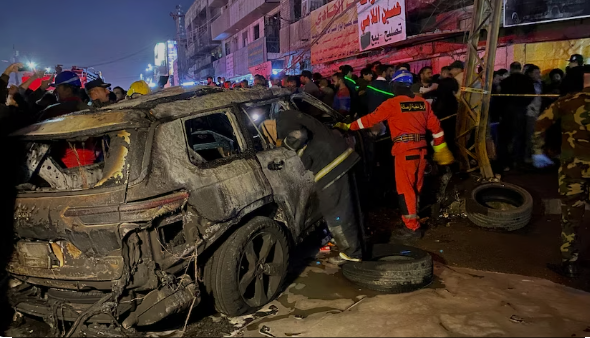
A senior leader of the potent Kataib Hezbollah militia was killed by an American drone strike that detonated an automobile in the capital of Iraq on Wednesday night. The commander was in charge of “directly planning and participating in attacks” against US personnel in the area, according to a statement from the US military on Wednesday.
A key highway in the eastern Baghdad suburb of Mashtal was struck by a precision bomb, drawing a crowd as rescue workers combed through the debris. It was carried out in the midst of high regional tensions and is expected to infuriate Iraqi government authorities even more, as US officials claim they were not informed beforehand about the strike.
Numerous diplomatic compounds are located in the tightly guarded Green Zone, which was cordoned off by security personnel. Social media posts encouraging demonstrators to storm the U.S. Embassy raised concerns.
Divergent accounts emerged on the death toll; American officials claimed that only one person was killed in the initial assessment and denied any harm or death to civilians. Three people, including Wissam Muhammad Sabir Al-Saadi, also known as Abu Baqir Al-Saadi, the commander in charge of Kataib Hezbollah’s activities in Syria, reportedly died, according to two sources with Iran-backed militias in Iraq. Later, in a statement, Kataib Hezbollah declared his death “following the bombing of the American occupation forces”.
These officials were not authorized to speak with journalists, so they spoke under anonymity.
“At this time, there are no indications of collateral damage or civilian casualties,” the U.S. Central Command stated in a statement. The United States “will not hesitate to hold responsible all those who threaten the safety of our forces,” it continued.
The 9:30 p.m. local time strike is expected to exacerbate the already tense relations between Washington and Baghdad.
It occurs only a few days after the U.S. military, in retaliation for a drone strike that killed three U.S. troops and injured over forty others at a base in Jordan in late January, launched an airstrike on dozens of sites in Iraq and Syria used by Iranian-backed militias and the Iranian Revolutionary Guard.
The attack in Jordan has been attributed by the United States to the Islamic Resistance in Iraq, a large coalition of militias supported by Iran. The United States would continue to strike against those who carried out the attack on Jordan, as President Joe Biden and other prominent figures have repeatedly warned. Furthermore, authorities have hinted that important militia leaders will probably be targets.
In the context of the ongoing Israel-Hamas conflict, the Islamic Resistance in Iraq has repeatedly claimed strikes on American military bases in Iraq and Syria, claiming that these actions are retaliation for Washington’s backing of Israel in its war in Gaza, which has resulted in the deaths of over 27,000 Palestinians, according to the Health Ministry in the territory controlled by Hamas.
Since October 18, there have been almost 170 attacks on American forces in Iraq and Syria; nevertheless, the most recent drone strike in Jordan, which is the sole one in that nation thus far, was the first to result in the deaths of American soldiers. Since October 27, the United States has retaliated by attacking places where Iran’s Islamic Revolutionary Guard Corps and other Iranian-backed organizations, such as Kataib Hezbollah, store weapons, conduct training sessions, and maintain command and control.
Wednesday’s U.S. strike in Iraq’s capital drew analogies to the 2020 drone strike in Baghdad that killed Iran’s Quds Force head Gen. Qassem Soleimani, in response to attacks on U.S. outposts there and an assault on the U.S. Embassy in Baghdad. Abu Mahdi al-Muhandis, the deputy leader of the Popular Mobilization Forces, an Iraqi militia backed by Iran, was also slain in that bombing. Furthermore, it infuriated Iraqi officials, who then demanded that American forces leave the nation.
Following the strike in Jordan, Kataib Hezbollah had said in a statement that it was ceasing attacks on US forces in order to prevent “embarrassing the Iraqi government,” while other factions had promised to carry on the struggle.
The Syrian Democratic Forces, a Kurdish-led organization that is aligned with the United States, lost six fighters when a drone attack on a base that houses American forces in eastern Syria occurred on Sunday, according to the Islamic Resistance in Iraq.
The most recent flare-up in the regional conflict occurred soon after Israeli Prime Minister Benjamin Netanyahu, who vowed to fight until “absolute victory,” on Wednesday, rejected conditions put out by Hamas for a hostage-release deal that would result in an ongoing cease-fire.
Additionally on Wednesday, two airstrikes in the Ras Issa area of the Salif district in the province of Hodeidah were reported by the Houthi rebel media office in Yemen.
